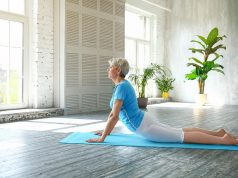Some clinically meaningful improvements seen compared with education or inactive control
By Elana Gotkine HealthDay Reporter
TUESDAY, March 14, 2023 (HealthDay News) — For older adults, yoga seems beneficial for markers of frailty compared with education or inactive control, according to a systematic review published online March 13 in the Annals of Internal Medicine.
Julia Loewenthal, M.D., from Brigham and Women’s Hospital in Boston, and colleagues examined the evidence on the effect of yoga-based interventions on frailty in older adults using data from randomized controlled trials conducted among adults aged 65 years or older. Data were included from 33 studies, with 2,384 participants, identified from varied populations. The yoga styles were mainly based on Hatha yoga, and most included Iyengar or chair-based methods.
Measures of gait speed, handgrip strength, balance, lower-extremity strength and endurance, and multicomponent physical performance measures were included as single-item frailty measures; none of the studies included a validated definition of frailty. The researchers found moderate-certainty evidence that yoga improved gait speed and lower-extremity strength and endurance compared with education or inactive control. Low-certainty evidence was found for balance and multicomponent physical function measures, and very low-certainty evidence was found for handgrip strength.
“Yoga may affect certain frailty markers that are associated with clinically meaningful outcomes in older adult populations, most notably gait speed and lower-extremity strength and endurance,” the authors write. “However, yoga may not offer benefit over active interventions like exercise or tai chi.”
Copyright © 2023 HealthDay. All rights reserved.








